< Prelude | 01 | 02 | 03 | 04 | 05 | 06 | 07 | 08 | 09 | 10 | 11 (Special) | Postlude >
- CATEGORY: Visual Big Finish
- CATEGORY: Nostalgia
- CATEGORY: Faux-hope
- CATEGORY: Actor usage
- CATEGORY: Writers’ Room
- “The Ahistocrats!”
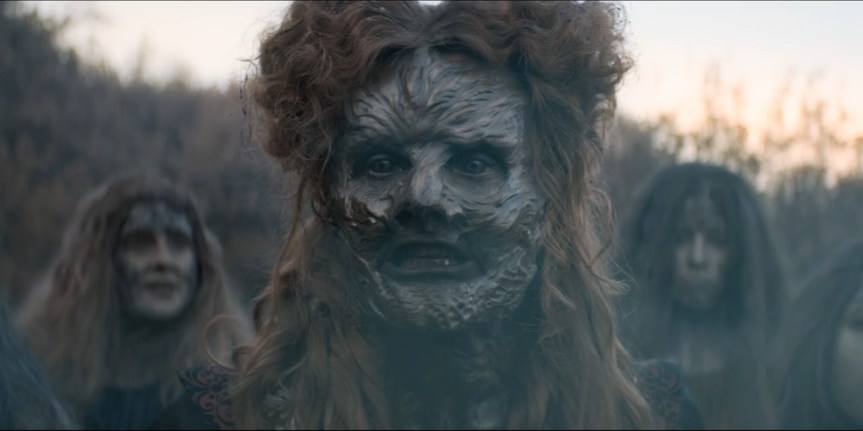
CATEGORY: Visual Big Finish
- Perennial nitpick, but the decision to both never do anything with the leads’ costumes and never have any of the one-off characters notice their wildly incongruous fashion seems like a flagrantly abandoned opportunity for visual fun.
- Doctor Who here reverts to an extremely low-effort mode – a celebrity historical with aliens, that plays the celebrity for laughs. Never mind Big Finish; they were doing this in Classic Who, with often mixed results. On the rad-trad scale, this is a strong contender for traddest Series 11 episode yet.
- Director Sallie Aprahamian is back from Arachnids in the UK with a showing that’s not quite as unilaterally pleasing as last time.
- The overhead shots of the woods are fantastic.
- The repeated use of mud-on-lens is at least distinctive.
- Using the same shot for the witch reveals twice in a row is a bit odd.
- Fixing the camera to the log as it plunges into the lake is a neat touch.
- Yet again the editing is a nightmare. I was flat-out stunned to find out Granny Twiston had actually died, based on how little time she spent underwater and how rapidly the scene elapsed. Later, scenes like that farce of Graham and Ryan trying to stop James and Becka from leaving the room become insufferably sluggish and slow, with no comic rhythm to speak of.
- Intriguing that this episode is only about as long as pre-Chibnall NuWho (46-ish minutes). Putting aside the fact it’s starting to look like reducing the episode order to get 5 extra minutes per episode wasn’t worth it – although the thought of an even longer Series 11 makes my life flash before my eyes – I’ve occasionally thought that some of these stories seem like they might have either had material cut out of them, or been artificially extended in the editing suite to fill out the timeslot, or both. Something’s afoot behind the scenes here.
- Small Ryan detail of the week – his nearly going for Yaz with the axe made me laugh.
- I have to wonder about a certain musical choice…it seems like Akinola wants us to feel genuinely bad for James when he tells us about his sordid origins, because the sad strings kick in again. The script and performance seem to be shooting closer to bleak irony, because the guy as depicted here is a comically buffoonish monster, but tonal incoherence is just par for the course these days.
- As a side note on the music area, I think I’ve finally worked out what Yaz’s theme is, and it’s hilarious in its piddliness.
- Speaking of Yaz, when she gives her awkward speech we get the typical synth bwaaaaaaah again.
- The references to a “flat team structure” are funny for the wrong reason, namely the fact that Team TARDIS blatantly is not one. This is yet another case of the show telling us things it wants us to believe to be true, rather than showing us the proof. Though, curiously, the fact the Doctor raises it herself after Graham assigns her the witchfinder hat makes it seem a bit like an empty protestation. Almost as though the script knows on some level that it’s bullshit, really. We’ll return to this idea of Witchfinders having an odd current of self-awareness.
- The zombie witches look great. Shame about how they’re used, and everything, but full marks for the costume design.
- On the other hand, the magic-psychic-death-waves they use to kill people look like utter shit and don’t match the aesthetic at all. I’m reminded of the wonderfully evocative Boneless from Flatline, who in the last ten minutes suddenly started firing lightning beams. You can always tell when they don’t have a good idea for how the monsters should interact with the environment.
- The plot goes in impressively pointless circles of characters travelling back and forth; impressive in the sense that it manages to recreate Classic Who-style pacing in a NuWho episode. Of note is the bit where some characters follow the zombie witches all the way up to the house to watch them pick up an axe, then all the way back.
- Also, the three companions are only really here to fill space this week. Yaz’s little anecdote, and its brief reprisal by the Doctor on the ducking stool, could be removed with near-zero thematic loss to the episode (which already does more than enough to stress its interest in women attacking each other).
- After taking a brief hiatus in Kerblam!, Big Finish narration comes back with a vengeance this week. You can hear it in virtually any piece of Morax dialogue, and the script makes sure to have Thirteen stop mid-conversation to explain “If I was still a bloke, I could get on with the job and not have to waste time defending myself,” but the most skin-crawling examples must all come from the climactic scene.
DOCTOR: The torches are working. They won’t come near the flames. […] Everybody back! I’ve reactivated the prison. Back you go, King of the Morax. […] Jail reenergized. […] Feel that security system kicking back in, sucking every Morax cell back. Back down into Pendle Hill. Back out of the bodies they hijacked. (Source) - One thing that I was worried about, but turned out alright, is that wordless moment where we see close-ups of Thirteen and James making eye contact as she’s about to be ducked. Storytelling that isn’t laboriously verbalised is good, but if she’d somehow convinced him to halt the trial just from a look, I’d have been a bit shat. But the utter inefficacy of Thirteen’s appeals to James’ better nature are something to look at later on.
- Shall we talk about the Morax? The exact moment they’re revealed is the moment the episode completely ceases to interest. They’re a load of garbage. Their design is sub-Sarah Jane Adventures and their dialogue is sub-Class. They’re every “really angry warrior race who wants to take over the world” you’ve ever seen in a naff sci-fi show, except they say “fill” a lot. The idea of sentient mud that infects people loses all of its lustre as soon as it’s drained into this banal-as-hell premise. Exactly like Tim Shaw, they introduce themselves by saying a lot of expository words to the Doctor as soon as they appear.
- And then the episode fucking cuts to black and skips the bit where the baddies get away. It’s The Ghost Monument all over again! With another dash of Tim Shaw in that they inexplicably leave all the unconscious good guys alive and uninfected, purely so the plot can continue.
- The design of the Morax king is…something.
- The plot culminates in the most unutterable of visual background noise – people running about randomly and shouting, until the Doctor can whack the plot device in the middle and save the day. Witchfinders‘ attempts to perform the generic Doctor Who beats are so half-arsed it’s hilarious. Also, absolutely any talk of “Morax energy!” makes me want to gargle retrogenitor particles.
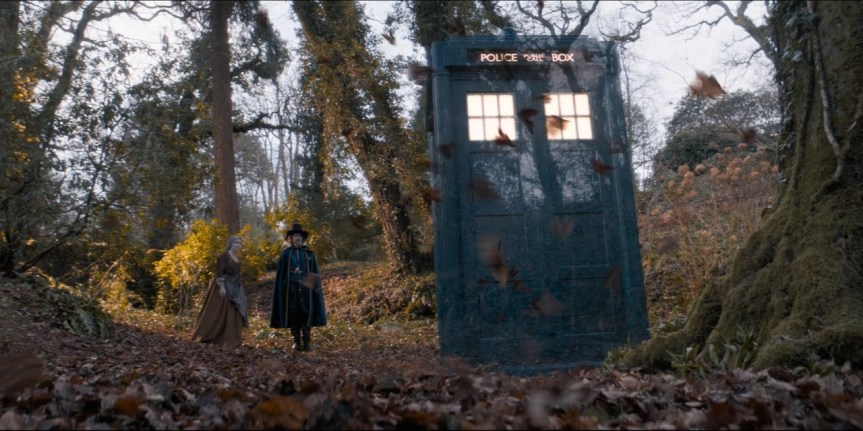
CATEGORY: Nostalgia
- Going beyond the capture-and-escape pacing, there’s a glimmer of Classic Who – specifically the black-and-white eras – in how this whole thing is structured; it starts out in medias res and then just sort of stops instead of ending. Rather than trying to cook up some clever end point, it concludes with a standard TARDIS dematerialisation, complete with side characters looking on in amazement. I struggle to think of this as a good thing. It made a certain sense back in the period when each serial ran into the next (and sometimes you’d get some gloriously abrupt endings out of it, like Mind Robber‘s or Enemy of the World‘s); no such serialisation exists in Series 11.
- This episode is a bit like Shakespeare Code turned on its head. You have a comedic celebrity historical, where the alien baddies (who, coincidentally, look like witches) are seeking to exploit the celebrity for their evil plan. The inversion is that where Code fetishises Shakespeare, Witchfinders treats James as mostly a comedic obstruction; a bumbling buffoon who the Doctor and friends must babysit.
- Something I didn’t register at all, but had pointed out by my esteemed colleague Broken Mirrors, is that the plot bears a vague parallel to that of Day of the Moon – the Doctor assists a power-mad ruler (who’s responsible for many deaths) in sorting out an alien threat that he’s completely misunderstood the nature of, and said figure does not receive any sort of redemption at the end of the episode.
- One nostalgia-op that’s glaringly avoided is any possible acknowledgement of the fact the Doctor has met Satan (and in a fairly well-known episode with the most popular Doctor of the revived series). You can scarcely hold this against the episode, but it’s a great example of how a small detail can just read oddly to anyone who knows even half of their stuff, especially in an episode that references Satan nearly forty times.
- James asking “Just as you hide behind ‘Doctor’?” is entirely too Moffat-era for this shit. I might go as far as suggesting this is a problem. Those thematic concerns have been picked up, mined within an inch of their life, tied up with a bow and dumped – all very recently. Having little, inevitably unresolved fragments of them floating about in an era that’s supposed to be doing its own thing just seems like carelessness, or amnesia, or lack of new ideas. Let’s hope it doesn’t become a trend.
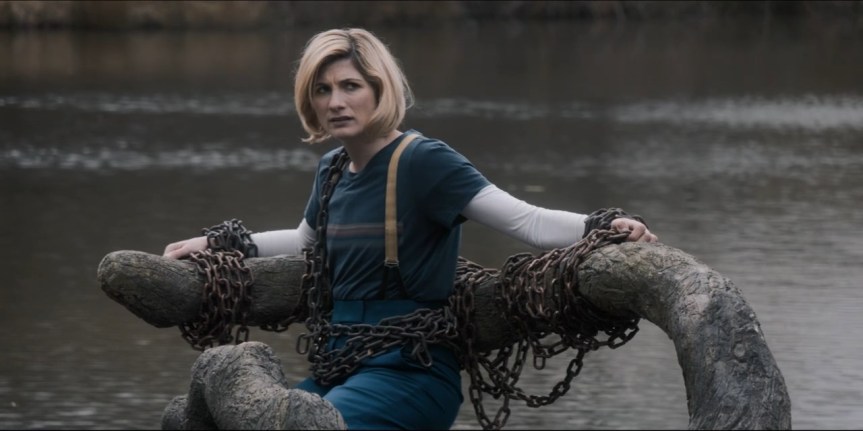
CATEGORY: Faux-hope
- I always chafe when I hear that old chestnut argument about Biblical ethics which boils down to “the old testament is just bad lol, the new testament was the sequel which magically fixed everything and introduced the concept of empathy! see this one Jesus quote?” because it’s both a Gordian knot of fucked-up religious implications and, well, just plain shit. One of those optimism-through-ignorance things that somehow manages to inadvertently be more insulting. So, completely at home in the show that produced Rosa and Kerblam, is what I’m saying.
- But to be fair to this episode, I thought the brief looks into the cultural misogyny of the setting were actually pretty good, and – crucially – slotted into the Doctor Who format with nary a seam visible. The script finds a way to work it into that comedic routine where Graham suddenly has to pretend he’s the boss and Thirteen the assistant, which puts them both on the back foot and forces them to improvise (something it doesn’t feel like we’ve seen that often this series, especially from Thirteen). The takeaway is that this can be an aspect of a historical setting the characters visit, you can (gasp!) acknowledge the Doctor’s gender, and nothing about it needs to upend the show or feel particularly unnatural. Having said that, there might be something wise about waiting until the second half of the series to touch on this territory, rather than drop the load within the precious first few impressions of the first ever female Doctor.
I feel like the episode handles misogyny better than its last visitation in Twice Upon A Time, which is neither a high bar nor a surprise (considering this episode was written by a woman, and that episode was written by Steven Moffat). - James’ fetishisation of Ryan as a “Nubian prince” is…interesting. I’ll be honest, I have no idea how to feel about that. I’ll just note…man, black companions have it fucking rough, huh? Another parallel with Shakespeare Code (in that case it was “queen of Afric”).
- Thankfully, they don’t make as much of James’ campness stemming from his sexuality as it initially seems like they might. Although I must note that the climax revolves around him being menaced by a giant phallus that wants to “fill” him.
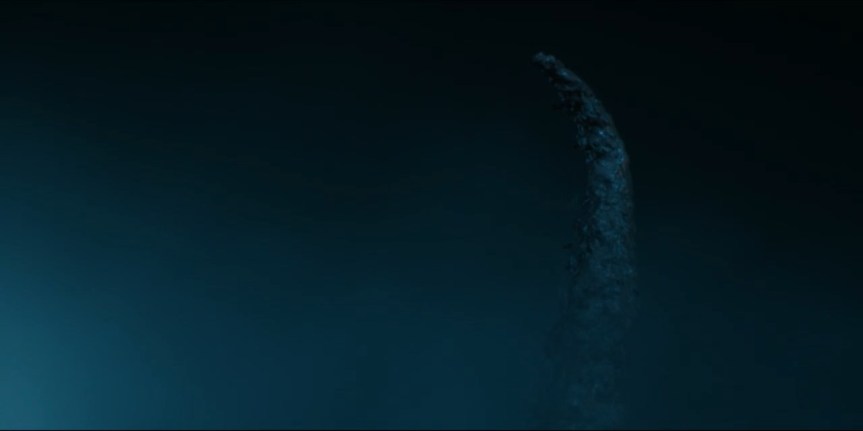
- Witchfinders makes what I’ll generously call a pretence of getting at the deeper causes of the witch hunts; the Doctor accuses both James and Becka of different forms of abuse. This (bad) assessment from Indie Wire describes how she “rages beautifully against the machine that lead to the witch trials”, but I think it’s safe to say that this does not, in fact, happen – virtually no interrogation of power structures, despotism or class is made here; instead we get an analogy to Yaz’s playground bully on one hand and an exploration of James’ manpain on the other. Hearing the Doctor waffle about how he was just “scared to face up to the darkness inside” or whatever is more of the kid-gloves treatment of murderous authorities that infests all of Series 11, even poor sweet Demons of the Punjab a smidge. But there’s a saving grace, which is that Thirteen’s impassioned appeal to James to “be better than that” ends up being revealed as utterly impotent.
- DOCTOR: Evil be to him that evil thinks. You wear it like a hero, even though you’re killing and scapegoating and stirring up hate.
Nitpick, but oh lord am I starting to hate “hate” as a directionless euphemism for targeted bigotry. That’s one media trope I don’t need cameoing on Doctor Who. Something also smacks of this when Willa laments “everyone turning on each other”. It’s not inaccurate, per se, but these characterisations of systemic mass murders that just boil them down to “nasty humans being mean to each other” elide the power dynamic, the specificity of the victims, the social forces – it’s just all so wishy-washy. One would think a story about witches would be angrier. - On the other hand, the Doctor aligning herself with the archetype of the “mouthy woman” that inspired so much loathing (and so many torture techniques) throughout history? I love it; it’s another thing that gets profoundly more edge from Thirteen being female. The Doctor is by nature a character who doesn’t shut up when other people want her to; words are her tools (or, er, they’re supposed to be. I don’t know how well that holds up with Series 11).
- There’s a little hint of something good when Willa proudly decrees that “there are more powerful people here than kings and queens. There’s us, together.” (I’ll save complaining about her character arc for later.) What’s fucking weird is that this immediately culminates in the Doctor and friends consciously turning themselves into the witchfinder analogues – playing dress-up as the murderers. “Morax-finder General, back in command”, says Graham, giving the Doctor the hat. Andrew Ellard pulled back from the observation that this “feels almost like wearing white sheets during Rosa” (probably the only way in which Rosa could become any more white-oriented). The rallying call of “Witchfinders united, at your service!” gives way to the disquieting realisation that the title of the episode is probably referring to the Doctor and her friends. In what universe was this necessary?
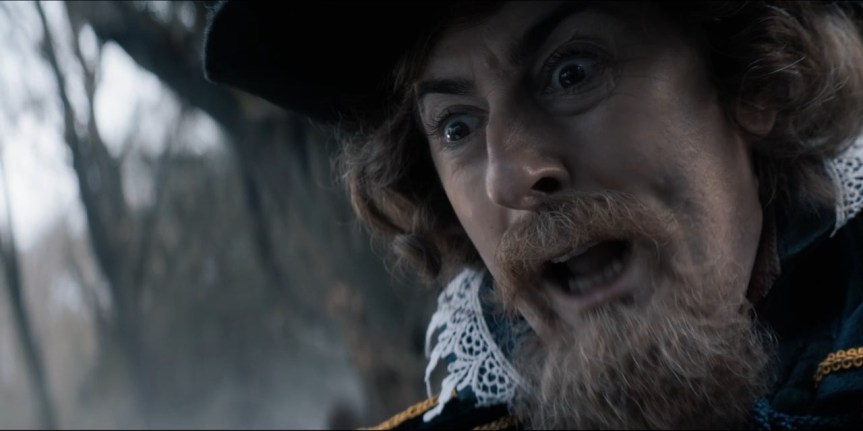
CATEGORY: Actor usage
- The Doctor’s opening stunt of diving into the lake to rescue somebody feels like the first time anything of this sort has happened since her crane jump in The Woman Who Fell To Earth. As a result it comes across as oddly refreshing, though that might also just be down to how infrequently we see the Doctor swimming in general. Nonetheless this contributes to a further uncertainty about the kind of role Series 11 wants its Doctor to play in the show.
- Despite myself, I actually begin to like Thirteen at some points in this episode.
- Despite any qualms I may have about her speech to James while she’s tied up, it’s a nice opportunity for Whittaker to show off some of the Doctor’s ambiguity and complexity for once. I’d particularly highlight her look after James poses that Moffat-esque question about her title.
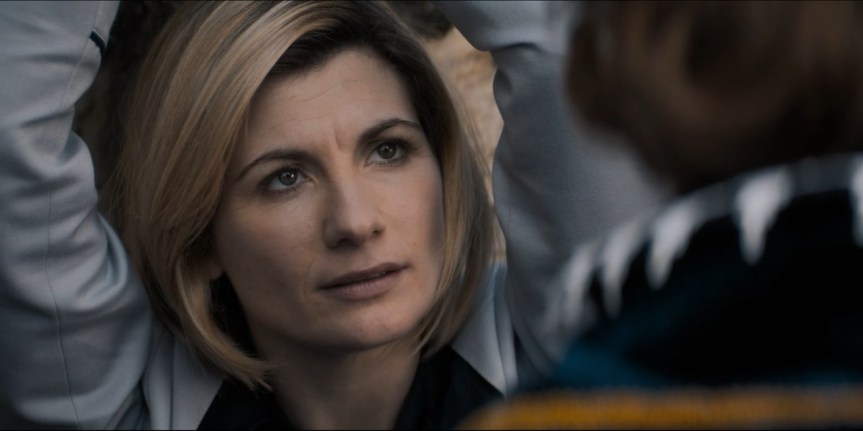
- Plus I’m relieved someone’s bothering to write her as understanding that life is more complicated than an evil/heroic dichotomy. This hasn’t exactly been a major problem in Series 11, but only because of how rarely the Doctor has confronted anything resembling evil.
- The ducking stool scene where she behaves impudently to Becka is another moment where Whittaker’s an actively enjoyable presence. Honestly, even “fam” was funny this time. If I had to define all this in broad strokes, the times when she’s a disruptive, weird or awkward presence are usually her best moments – it’s whenever she has to fill the “hero of the show” role that she bores.
- Despite any qualms I may have about her speech to James while she’s tied up, it’s a nice opportunity for Whittaker to show off some of the Doctor’s ambiguity and complexity for once. I’d particularly highlight her look after James poses that Moffat-esque question about her title.
- Meanwhile, Alan Cumming completely steals the fucking show by giving Series 11 exactly what it deserves – a pisstake.
- WiTcHcRaAaAaAfT!
- His every delivery of “Satan” is great, but my favourite might be “Satan rises!“
- And yet, for all that, it’s hard to say that bringing on a great actor – who once did a production of Macbeth in which he played every character – and then essentially having him fuck about and treat the whole thing like a joke is genuinely essential television. Especially since this is far from his funniest showing.
- Dear god, I feel bad for Siobhan Finneran having to deal with that gigantic expository monologue delivered entirely through shouting.
- Ryan’s sudden involuntary giggle upon hearing about James’ life story is this week’s funny Tosin moment. The second iteration of it after James asks Ryan to stay with him at the end is, decidedly, a letdown.
- Feels unfair to say this, but is anyone else not feeling Walsh sometimes? When he’s yelling at people to lift the Doctor out of the water “nOw!” it sounds like he only half cares.
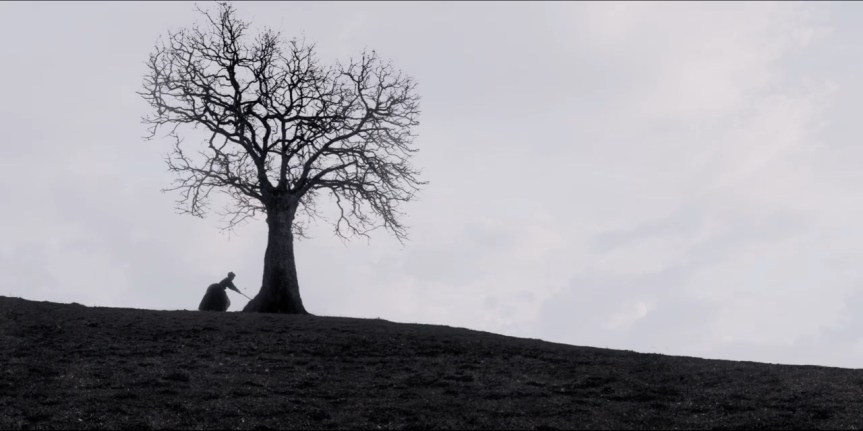
CATEGORY: Writers’ Room
- These episodes are so blatantly re-ordered. The opening dialogue with the Doctor warning her pals – on the third historical adventure this series, and probably the one in which history’s fixedness is the least plot-relevant – that the course of history must not be interfered with, plays out as though they’ve forgotten the previous episodes even happened. Even having a writers’ WhatsApp chat can’t solve contradictions that come up when the episodes are put on Shuffle.
- A minor trend this series is the Doctor having no idea when or where she is when she gets out of the TARDIS.
- Ryan’s crack about hipsters at the start got me. In general the episode has a decent grasp on companion banter.
- At this point I’m forced to conclude that the psychic paper must have a lasting, powerful post-hypnotic effect on anyone who reads it, because Becka’s willingness to believe that the Doctor and her crew are the fucking Witchfinder General and company (immediately after the Doctor has just jumped into a lake to stop a witch trial from happening) makes absolutely no sense otherwise. It’s alarming to see a traditionally handwavey device slowly encroach upon outright mind control.
- As we’ve already observed, the episode is padded like fuck, which becomes even weirder when you notice that the plot doesn’t kick in until the last eight minutes.
- Not a fan of Yaz’s speech. It feels unattached. Doesn’t help that she’s still so undefined as a character, but having her deliver such a sizeable lore dump in such a self-contained, shoehorned manner does little to make up the difference.
- When the reanimated corpse of Willa’s gran appears, the Doctor stops to apologise to Willa. I wonder if this line was inserted by Chibnall or at his request, as part of his Sorry Agenda established in episode 1.
- The fixation with “filling” is curiously specific.
- The concept of murdered witches Gothically returning from the grave to wage magical vengeance against those who murdered them is absolutely fizzing with potential; it seems like an obvious Doctor Who approach to the concept that would combine horror with a powerful ethos of justice. Unfortunately, it goes precisely nowhere in The Witchfinders, and isn’t even particularly visually exploited; the shambling witch zombies fade into irrelevance as soon as the Morax shit starts up.
- What’s weird is that the episode seems like it wants to go there – zombie Granny is heard repeating the same prayer that she said to Willa before she died, implying that some aspect of her as a human (indeed, a spiritual human) still persists, even if it’s just her last living memory played on a loop. Not only is this left totally unexplored, its potential is decisively cut short during the climactic scene – we’ll come to that.
- The Doctor assumes that the mud must be from space. Tut tut. Would she have said that about Silurians?
- Witchfinders earnestly shows its work by inserting small details of dialogue that flag up the historical research without over-explaining; they’re allowed to just sit. James associating the Doctor with “Doctor Dee – the necromancer!” is an especially gratifying one.
- The Doctor’s speech layers on the gloop a bit thickly. “The mysteries of the heart”? Whatever.
- The whole “bitter woman accuses other, innocent woman of witchcraft” made me suddenly think of the corresponding bit in Belladonna of Sadness. (Forgive my limited frame of reference.) In general I think there’s a bit of a thing, a trope if you will, about taking structures of oppression where the audience expects a man to be the antagonist and subverting expectations by having it be a woman, who is herself is a victim of the same structure as the women she attacks – abuse perpetuated through internalisation.
- YASMIN: Oh, mate, seriously? Not witches. Bodies possessed by alien mud. Come on!
Atrocious. - Can’t claim to have done the research on this, but was there really no other way to lance an infectious boil of unknown origin than chopping off the entire leg WITH AN AXE? And if not, surely Granny Twiston would have seen/done shit that was just as bad if not worse in her role as local medical practitioner? Hmm.
- This entire brief attempt to pivot the episode into family tragedy territory is botched, thanks to being crammed into a single, rushed-as-hell, info-dump monologue which is also screamed. But on rewatch I did appreciate the detail of Becka declaring that she really is the witch. It’s the closest the episode comes to doing any sort of reclamation of witchiness, albeit in the mouth of the bad guy.
- MORAX: Now the Morax army shall rise again and take form. Your King shall be filled with our King, and we shall be free, to fill all of you. To fill this whole planet with rage and force and hate and Morax!
“Rage and force and hate and Morax.” That’s one for the history books. - The suffocating genericness of the Morax stifles their thematic potential.
- Ancient darkness buried under the Earth? Great.
- Royals? Still good. Maybe even better.
- A hidden army? Okay.
- An alien army exiled for war crimes? Um.
- Sealed in by ancient alien wood? What the fuck does this have to do with the rest of the story any more?
- Love the Doctor making excuses for the fact an ancient alien lock happens to be exactly as defenseless as the regular tree as which it’s disguised. It “eroded”. Okay.
- Honestly, the whole tree thing is so messy. The relationship between Granny Twiston and nature needed more establishment for the tree-chopping to not come off like a loose-end, let alone for it to justify unleashing the pre-Christian darkness at the heart of the story.
- On all fronts, a character-driven narrative is fighting to exist within this episode but is completely hollow, by which I mean there’s an external performance of it (i.e. Willa’s “arc” of facing her fears and becoming a Doctor), but no inner content (it happens a bit like a switch has flipped).
Weirdly, the episode consciously turns down its one shot at making anything of the familial aspect in the climax.
WILLA: I know you’re in there, Becka. I know you’re scared.
MORAX: Nothing of that pathetic woman remains.
It’s not hard to picture the Moffat-era version of this, where some part of Becka actually does still exist inside the Morax queen, and fights back against its control just enough to either save the day or commit suicide – or, really, any version in which anything to do with Becka or Willa’s character is relevant in the climax. - Even if you didn’t go that far, some acknowledgement of a possibility of redemption/de-transformation for Becka would have sharpened the cruel irony of James immediately blowing her up and looking smug about it.
- “No more witch hunts,” the Doctor sternly reprimands James at this point, like there’s any reason he’d listen to her, or like it would make any difference. Does she actually think she can convince him to stop the witch trials? Wasn’t she the one saying history mustn’t be interfered with at the start? There isn’t even a reply to this line, it’s positioned at the end of the scene. Another loose end, flapping in the wind. I’m reminded of her having a go at Karl in episode 1, but this is even more baffling.
- What’s more, this is the second time in the episode that she says it for no apparent reason. Earlier on, after instructing Graham and Ryan that they have to keep James and Becka inside so they don’t hunt any more witches, she adds, “Remember: no more witch hunts!” Were they trying to make it a slogan?
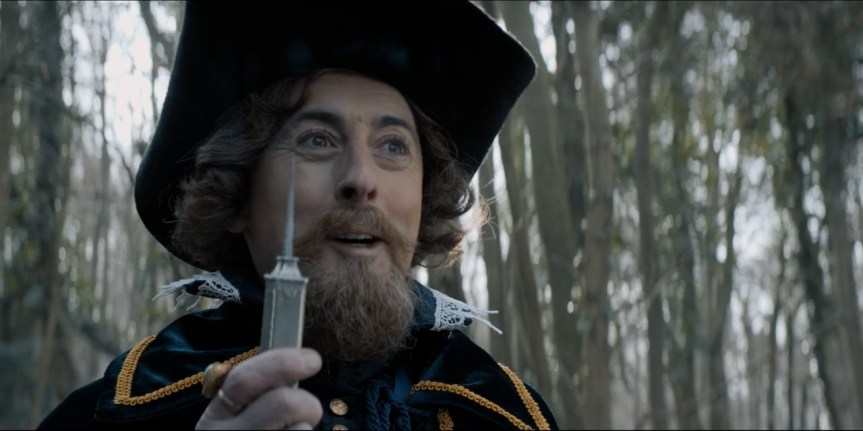
“The Ahistocrats!”
That was the final historical of Series Eleven. There have been three in total. Which doesn’t look like that big a number for a NuWho run, but takes on a bigger weight in light of the reduced episode order – historicals now make up close to one-third of the season. We can’t pretend they aren’t a major wing of the Chibnall era’s style.
So now they’re done, we should ask what the point was, and to do that, we should compare them.
Between Rosa, Demons of the Punjab, and The Witchfinders, we in effect have two celebrity historicals and one anti-celebrity historical. All three revolve around historical contexts in which a great many people were killed, albeit in different ways (though there is a not-unobserved parallel between the witch trials and the lynchings of black folk in America). Because Rosa only verbally references such a killing, rather than directly incorporating it into the narrative, it might be more accurate to say the linking factor is injustice, but there’s a recurrence of this peripheral vision in the other two as well – Demons gestures at the overwhelming, unseen presence of an unimaginably huge mass slaughter by focusing on a single death, while Witchfinders opens with a death then rapidly diverts away from it because it’s more interested in an adventure with mud monsters. All three episodes are placed at different distances from the ultimate historical trauma.
Their approaches to history itself are even sharper in contrast. Rosa fetishises a specific, heavily documented historical moment, while alienating it massively from its social conditions. Demons, servicing its theme of forgotten history, invents fictional characters inspired by various real-life accounts as an archetype or case study of the events. Witchfinders takes the strangest route, incorporating the detail that everything in the episode will get deliberately wiped from the records and forgotten…for no particular reason, other than to pay off the fact Graham has never heard of Bilehurst Cragg. All three stories run into the problem of negotiating Doctor Who’s relationship to events that really did take place; Rosa attempts to walk a tightrope of having the Doctor inserted deeply into the circumstances of Rosa’s bus protest without disrupting it (or getting particularly involved with Rosa herself; wouldn’t want to be insensitive…let’s not even fucking go there). Witchfinders goes with the convenient route, while Demons uses the irreconcilability of history with Doctor Who to its advantage – the unrecordedness of the main characters’ fates is part and parcel of the historical event it’s dealing with; history that was forgotten not via conspiracy, but via the sheer neglect that brought it forth to begin with.
One more thing…all three stories, concerned as they are with institutional injustice, are forced to take positions on the establishments concerned. Witchfinders goes after King James to some extent, but in the process finds itself largely hesitant to criticise the twisted structures that allowed one man’s neuroses to manifest in countless murders to begin with. Rosa‘s obsessed with street-level racists and has at most one line in which it implicates anybody higher-up; its quiet worship of (modern) police officers and presidents locates it on the side of the bosses even as it pretends to be about activism. Demons nurses a simmering grudge against Empire, though is reluctant to explicitly accuse it of anything beyond incompetence – but the story’s open-ended nature means that its biggest and most horrified conclusions may take place beyond the screen.
Then, on the complete other end of the dichotomy, is the question of how the three stories incorporate their sci-fi elements. Rosa extends present-day racism into the distant future in the form of Krasko; his principal role is to generate plot busywork for the heroes, followed by the climactic scene in which they go through the #Profound experience of having to pretend to be racist and witnessing Parks’ arrest. (There’s also a bootstrap paradox in there, though this never gets discussed.) Krasko is a sort of anti-Doctor, or Time Meddler; he and the Doctor interact with history in exactly the same way, which is to say they’ve both read the book – one’s just trying to change it while the other puts it back the way it was.
Demons is more subversive, using the presence of time-travelling aliens as a feint; by first setting up then removing the appearance of a Rosa-like “battle over history” narrative, the story reinforces the idea that the main characters are in fact fundamentally powerless – and that if history cannot be changed, then at the least it can be respected and mourned.
Witchfinders arrives at a more oblique solution entirely. There’s a slight parallel to Demons in that the locals initially attempt to slot the alien presence into their belief system (Thijarians = Demons; Morax = Satan), but then something very different occurs. While the first manifestation of the alien threat loosely draws from the historical setting (the idea of Satanic evil as an infectious presence, in the form of Becka’s Morax mud injection), its ultimate manifestation jettisons this almost completely to make way for a bargain bin Who baddie plotline. In the process, a story that appears to be about witch trials and their victims is shovelled out the door to make way for a final act that’s primarily concerned with the historical-celebrity-of-the-week. However, what brings it back in line with the other two historicals is that nothing ultimately changes or is improved by the presence of the Doctor – and the story appears quietly conscious of this, making a point of her utterly failed attempts to get through to James.
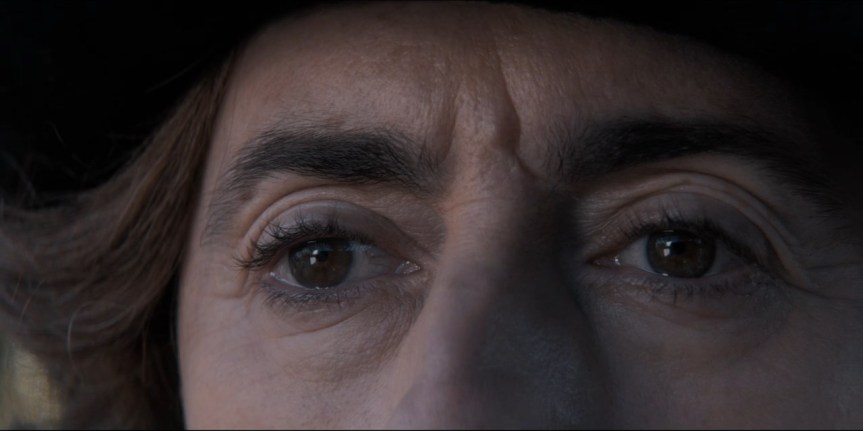
You can’t coherently discuss Series 11 without thinking about strategy, because the entire thing has openly been a marketing ploy from step one (as I’ve complained about at length). What’s more, Chibnall was gracious enough to tell us that “like Rosa Parks, Partition was one of the stories I knew I wanted to tell when I came into the job” in DWM. Even better, Whittaker flat-out spelled out Chib’s game plan before the first episode aired:
She is adamant that Doctor Who, in its new Sunday evening slot, has to be at the heart of our national conversation. “Otherwise what is the point in continuing to make it?” she asks. “Broadchurch had it, Game of Thrones has it. You want people to want to be in to watch it at the same time, when it is first on, so they are part of that conversation. To do that, it must reflect the world we live in. Chris was very particular about this season relating to what is going on in the world now. That is really important, politically. […]”
So I think we can assume that Chibnall’s special focus on stories of great injustice and trauma is done to appeal to a sense of our current “dark times” and “turbulent world”, as described by Yoss in Tsuranga. Although, just as when he said “we need a pillar of hope in these times” at SDCC, it’s a carefully undirected sentiment. I find it hard to believe that Chibnall would even fucking dream of talking about any of the reasons (or even what he believes to be the reasons) things have become exponentially worse this decade. You don’t have to be specific about despair to use it in marketing; Chibnall seems to want to create a kind of vague, ambient despair miasma, and to do that he’s pursuing historical storylines that need only the common factor of people undergoing immense levels of brutality. The contemporary social relevance of this is perhaps superficial, especially when the closest the series can get to even thinking about the C-word is Kerblam, which dramatises the compelling debate between letting humans work crushingly oppressive jobs or letting them starve.
But superficiality works in Chibnall’s favour, if Rosa is anything to go by. By making the engagement with both the past and the present as thin and unchallenging as possible, the episode is perfectly primed to reduce white people to tears and who gives a fuck about anyone else, really? 🤪 The effusive buzz surrounding the episode, and of course how difficult it was for poor Graham to have to look directly at a black woman’s suffering, tells its own story. Whereas Demons‘ more sincere approach and commitment to its Indian characters was more likely to make white people take sneering, reductive swipes at it in the middle of a comedic panel show.
AAAAAAAAAAAAAAAAAAAAAAAAAAA
Sorry, where was I? Anyway, something that becomes very apparent across these three historicals is that the “Doctor Who” structure pays them no dividends whatsoever. The need to be an adventure with an emotional arc for the Doctor and friends completely fucks over Rosa‘s chances of being a story about civil rights or black people. The need to have the Doctor save the celeb-of-the-week from a big alien baddie strangles Witchfinders‘ nascent story about women accused of witchcraft. Demons is the only one that looks the problem full-in-the-face and outsmarts it, by consciously and deliberately rejecting the narrative conventions…but perhaps it can only even get away with that because the two other historicals pick up the slack? Almost as though they’re the “tax” that must be paid to attain a single remotely intelligent story.
Why does the problem exist? The two drives are in competition – the desire to have the show tell important true stories of irreversible trauma, and the desire to have the show be a zany, undemanding adventure soundtracked by the crunching of popcorn in distracted jaws. A thing cannot be complex where it must also be simple, or messy where it must also be clean; collective where it’s forced to be individualistic, or clear-eyed where it is myopic in its very nature. One drive must win out.
Right now, one drive is stronger – the Doctor Who drive, or perhaps we should think of it as the Doctor Who death drive – because the show is in a period of reaction. It’s on the back foot coming out of Twice Upon A Time, trying to claw back viewers and cultural capital. It’s not in some kind of phase of imperial confidence where it can trot out more than one Demons per season (although, let’s be honest, that wasn’t going to happen anyway). The result is that Doctor Who exists in a very small box, trying to make sense of things that are very, very large.
But like we keep noticing, Witchfinders contains a strange awareness of this. The resolution makes it painfully plain how hopeless both the Doctor and Doctor Who are at even processing real-life atrocity. Because the attempts to address it are limp, trailing off, uncertain gestures, loose ends. “No more witch hunts!” What exactly does she fucking expect to happen? And what can we possibly hope to take away from this empty posture? It’s one thing for the Doctor to be demonstrated as incapable of fixing something, in this case James earlier on in the episode. That’s nothing notable. But for her to appear so outright…pathetic? While the show paradoxically exacerbates this by innocently appearing oblivious to it, acting like she said something conclusive and fading away to another scene? It’s baffling – it’s like on some level, the show has given up.
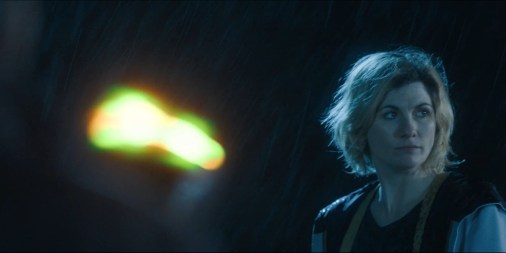
Perhaps that is it. A sign of the daunted, gibbering, mind-shattering incomprehension with which Chibnall Who gazes at the vast terror of reality. It’s set out to do something serious, and bitten off more than it can fucking chew. Vinay Patel had the sense to keep his script existing within its own means, keep it from ever cynically selling out its own premise, but his is the outlier. Here’s the shape of this sordid trio: if Demons is the success mode, then Rosa is the failure mode (as its desperate asteroid ending surely indicates), and Witchfinders is what it looks like when all the energy to even try has drained away. That should be obvious from the moment it stops caring about the witch trials, about ten minutes from the end. To be fair to it – at least it’s relatively honest about what it wants.
![Doctor.Who.2005.S11E08.The.Witchfinders.720p.AMZN.WEB-DL.DDP5.1.H.264-NTb.mkv_snapshot_13.57_[2018.12.04_01.18.45]](https://gigawho.files.wordpress.com/2018/12/doctor-who-2005-s11e08-the-witchfinders-720p-amzn-web-dl-ddp5-1-h-264-ntb-mkv_snapshot_13-57_2018-12-04_01-18-45.jpg?w=863)
Hey Gig! Why was this post nearly two weeks late?
A mixture of several massive inconveniences springing up during the week I was supposed to write it, followed by an endless slog of procrastination stemming from the fact that Series 11 is dull as shit. Sorry.

One thought on “CHIBSHOW: 08. Witchfinders United”